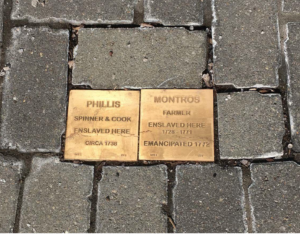
By Erik Ofgang in Connecticut Magazine on July 24, 2019.
Shortly before the Revolutionary War, an enslaved Connecticut man named Jeffrey Brace was beaten unconscious by his new owner, John Burwell of Milford. Burwell struck Brace with his fists, legs and a chair. In a written account years later, Brace recalled that one blow to his head during the beating was so hard it “pealed [sic] up a piece of my scalp about as big as my three fingers.” After waking up, Brace was subjected to two rounds of whipping and made to walk a quarter-mile barefoot in the winter.
Brace’s visceral, difficult-to-read account of the horrors of slavery in Connecticut is the type of story we don’t often hear about Northeastern states, says Dennis Culliton, a recently retired teacher at Adams Middle School in Guilford. In Connecticut, we’re good at “pointing our fingers south and saying how awful those people were,” he says. But when it comes to confronting our own past, we have more trouble. Continue reading.
